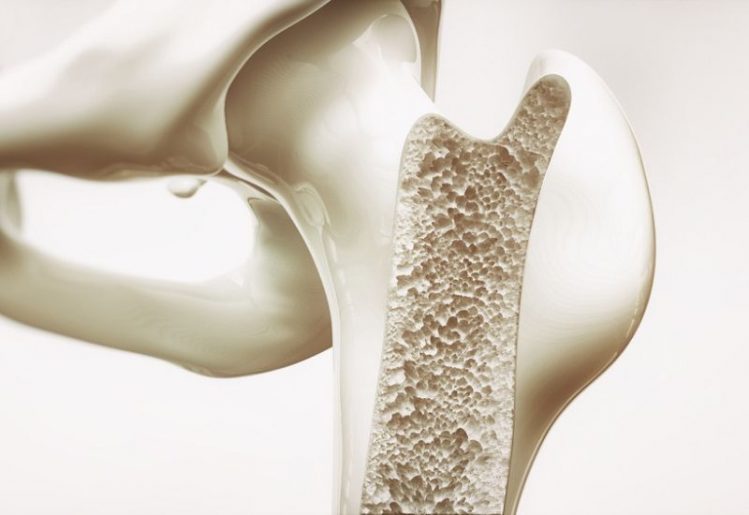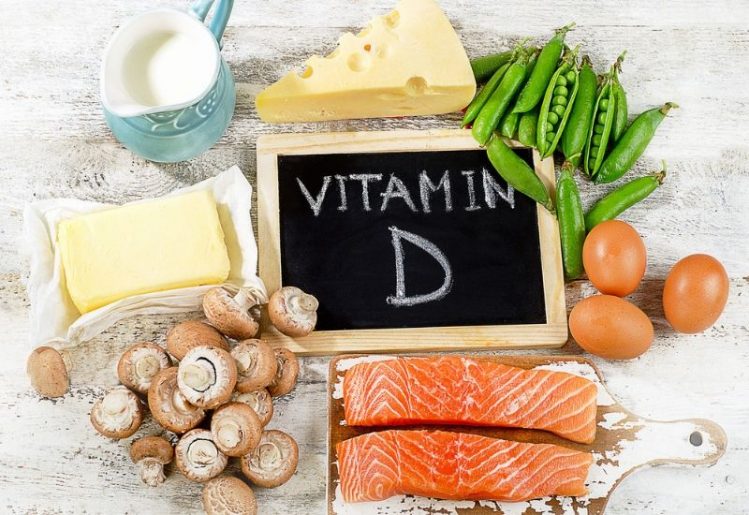Throughout your lifetime, your body produces bone in order to maintain high bone density. However, with age, this process slows and bone loss can begin to outpace healthy bone production, resulting in a condition called osteoporosis. This condition can affect men, but it primarily affects older women as decreased levels of estrogen that accompany menopause contribute to the process. In women, estrogen helps protect the bones, but a deficiency causes bone growth to slow. With a new study showing a common antibacterial chemical linked to osteoporosis, looking for natural ways to boost bone health becomes a more pressing concern.
The Consequences of Osteoporosis
 When a person develops osteoporosis, the health of their existing bones also becomes compromised. Since bone density is lost, the bones can become fragile and brittle. This is why people with osteoporosis are at a greater risk for fractures in the hips, spine and wrists. Although there are no observable symptoms of the condition, those who develop osteoporosis may exhibit a stooping of the spine. They may also experience bone pain as the condition worsens.
When a person develops osteoporosis, the health of their existing bones also becomes compromised. Since bone density is lost, the bones can become fragile and brittle. This is why people with osteoporosis are at a greater risk for fractures in the hips, spine and wrists. Although there are no observable symptoms of the condition, those who develop osteoporosis may exhibit a stooping of the spine. They may also experience bone pain as the condition worsens.
As previously mentioned, osteoporosis is most commonly the result of a decrease in estrogen levels in post-menopausal women. However, there are some lifestyle habits that can increase the risks of developing the condition. For instance, unhealthy eating habits deprive the body of essential vitamins and nutrients that help keep the bones strong and healthy. Additionally, smoking can also negatively impact bone health.
While there is no cure for osteoporosis, the condition can be treated by making lifestyle changes. Eating a healthier diet and taking certain dietary supplements can help strengthen the bones and slow the progression of the disease. Additionally, physical activity helps build body strength, including helping to stave off bone loss.
New Study Finds Common Chemical Linked to Osteoporosis
Triclosan, a chemical that was previously banned from use in antibacterial hand soap but can still be found in other personal care products like toothpaste, mouthwash and bar soap, has been found to pose serious health risks to millions of people in the way that it affects bone health. A recent study, which was conducted at China’s Hangzhou Medical College School of Public Health, sought to clarify why triclosan is so harmful to bone health.
The study drew data regarding adult women from the National Health and Nutrition Examination Survey. The data was gathered via face-to-face interviews from 1,848 adult women of various ages. In evaluating the women, bone density was tested, osteoporosis markers were examined and urine was tested for triclosan.
The research team discovered that women with higher levels of triclosan in their urine also had more mineral loss in their bones. Similarly, those with lower triclosan levels had healthier bone density. These results were not found in younger women, which may suggest that the effect triclosan has on bone density is cumulative.
The next step in the study was to compare triclosan levels with the presence of osteoporosis, but there were only a limited number of subjects with the condition. Of the post-menopausal women, only seven were found to have osteoporosis. These women were evaluated in four regions of the body for the presence of triclosan, but the compound could not be linked to osteoporosis in three of those regions. Within the fourth region, the upper thigh area, triclosan was associated with the development of osteoporosis.
While the study did show a link between triclosan and osteoporosis, the evidence wasn’t as compelling as was expected at the start of the study. The research did confirm that triclosan affects bone density in some way, but the research team admitted that further studies would be needed to more fully prove this common chemical linked to osteoporosis. Going forward, the next step will be to confirm a causal relationship between the compound and the development of osteoporosis.
Natural Ways to Boost Bone Health
Trying to avoid products that contain triclosan is one step you can take to keep bones healthy, but there are also many more natural ways to boost bone health. Here are just a few ways you can promote better bone health and stave off the loss of bone density.
Eliminate Bad Habits
As previously discussed, smoking is harmful to bone health. In particular, it can prevent new bone growth by decreasing estrogen production. Drinking alcohol can also negatively affect bone health.
Increase Physical Activity
Exercise protects your bones in a number of ways. First, it helps to build muscle, which serves as a better protective layer over bones than fat tissue. Additionally, frequent exercise will help improve balance, range of motion and agility, which are all useful in helping to prevent falls.
Vitamin D and Calcium
 If you remember the milk commercials from your childhood, you already know that calcium is essential to bone health and growth. Every adult should be consuming 1,000 mg of calcium daily, but women over 51 years should be getting 1,200 mg daily. Anyone over the age of 71 should also be getting a minimum of 1,200 mg of calcium a day. Your body also needs vitamin D, which is used to help absorb calcium. The best way to get vitamin D is through moderate sun exposure, though it can be also be found in dietary supplements.
If you remember the milk commercials from your childhood, you already know that calcium is essential to bone health and growth. Every adult should be consuming 1,000 mg of calcium daily, but women over 51 years should be getting 1,200 mg daily. Anyone over the age of 71 should also be getting a minimum of 1,200 mg of calcium a day. Your body also needs vitamin D, which is used to help absorb calcium. The best way to get vitamin D is through moderate sun exposure, though it can be also be found in dietary supplements.
Additional Supplements for Bone Health
There are a number of other vitamins, minerals and natural compounds that can help keep bones strong. For instance, a steady supply of magnesium will aid dietary calcium in promoting better bone strength. Magnesium is found in dark, leafy green vegetables, nuts and whole grains.
An adequate supply of vitamin K will also help bone strength by binding calcium to the bones. In regard to vitamin K, taking too much can be just as harmful as developing a deficiency. If you choose to take a vitamin K supplement and you are on blood thinners, talk to your doctor first.
Finally, methylsulfonylmethane, or MSM, can help treat the pain and discomfort associated with osteoporosis. It does this by reducing internal inflammation and alleviating joint pain. MSM has also been found to boost the health of the immune system, which may help protect against bone loss and other traits of osteoporosis.
While a healthy diet and plenty of exercise is always essential to overall health, taking a supplement can help ensure you get all of the vitamins, minerals and bone-building ingredients you need each day.


